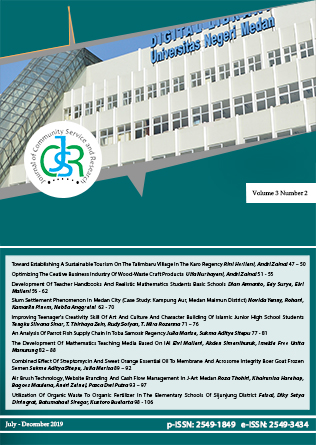SLUM SETTLEMENT PHENOMENON IN MEDAN CITY (CASE STUDY: KAMPUNG AUR, MEDAN MAIMUN DISTRICT)
DOI:
https://doi.org/10.24114/jcrs.v3i2.15807Abstract
Kampung Aur settlement is one of the slums of 18 villages determined based on Medan Mayor Decree No. 640/039.K / I/2015, with a very poor slum level, 3.49 Ha slum area and 307 households. Location Slums are scattered in various areas in Medan City, including along the river banks, along railroads, port areas, industrial areas, trade areas, and border areas of Medan City. The focus of the study was the slums of Kampung Aur, Medan Maimun District and the reluctance of residents to be relocated. The research objectives are; to find out the factors that cause the reluctance of relocation of residents of slums in Kampung Aur, Medan Maimun District, Medan City. The research method used a qualitative descriptive. The results of research on the reluctance of residents due to relocation of several factors, among others; 1) Settlement that has been passed down from parents has finally become the basis for residents to claim their legal presence in agararia, 2) the location of Kampung Aur which is near and downtown such as offices, restaurants and others that are very supportive for the economic activities of citizens, 3) the high family ties between residents supported by the same ethnic / ethnic origin, and a sense of shared destiny, 4) basic housing services that are deemed sufficiently adequate such as access to and out of villages, roads that connect between RTs, available clean water facilities, and electricity servis, 5) there are facilities and infrastructure that can meet the needs of citizens to socialize with each other and strengthen family relationships.Keywords: Slums; Settlement; Phenomenon.Downloads
Published
2019-12-24
Issue
Section
Articles
License
Authors who publish with this journal agree to the following terms:
- Authors retain copyright and grant the journal right of first publication with the work simultaneously licensed under a Creative Commons Attribution License that allows others to share the work with an acknowledgment of the work's authorship and initial publication in this journal.
- Authors are able to enter into separate, additional contractual arrangements for the non-exclusive distribution of the journal's published version of the work (e.g., post it to an institutional repository or publish it in a book), with an acknowledgment of its initial publication in this journal.
- Authors are permitted and encouraged to post their work online (e.g., in institutional repositories or on their website) prior to and during the submission process, as it can lead to productive exchanges, as well as earlier and greater citation of published work (See The Effect of Open Access).
- This work is licensed under a Creative Commons Attribution-ShareAlike 4.0 International License.
This work is licensed under a Creative Commons Attribution-ShareAlike 4.0 International License.


